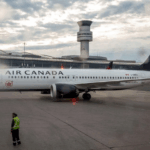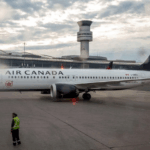
Air Canada reversed course on plans to resume flights on Sunday after the government ordered more than 10,000 cabin crew to end a strike that led to hundreds of cancellations.
The Canadian Industrial Relations Board (CIRB) instructed staff to return to work by 14:00 EDT (18:00 GMT) and stated that a collective agreement that expired on March 31 would be extended until a new one was agreed upon, Air Canada said.
However, the Canadian Union of Public Employees (CUPE) directed its members to disregard the order. The union accused the government of “caving to corporate pressure”, having resisted a forced agreement.
The airline said it would aim to resume operations on Monday.
Jobs Minister Patty Hajdu ordered binding arbitration to end the dispute, after more than 10,000 Air Canada flight attendants walked out earlier on Saturday, causing 700 cancellations.
Flight attendants are calling for higher salaries and to be paid for work when aircraft are on the ground.
The strike took effect at 00:58 EDT on Saturday, though Air Canada began scaling back its operations before then.
Air Canada said it had suspended all flights, including those under its budget arm Air Canada Rouge, for the duration of the strike, and advised affected customers not to travel to the airport unless with a different airline.
Flight attendants picketed major Canadian airports, where passengers were trying to secure new bookings earlier in the week.
But later on Saturday, Hadju said “stability and supply chains” must be preserved, while the two parties had been “unable to resolve their differences in a timely manner”.
She invoked Section 107 of the Canada Labour Code to restart negotiations arbitrated by the government, with a resulting deal being legally binding.
Air Canada, which flies directly to 180 cities worldwide, said the first flights will begin this evening, but cautioned that it would take several days to return its operations to normal.
“During this process, some flights will be cancelled over the next seven to 10 days until the schedule is stabilised,” it said in a statement. “Air Canada deeply regrets the inconvenience to its customers.”
Cupe described Hadju’s decision to intervene in the dispute as “violating our charter rights”, saying it will cause “incalculable damage” to workers’ rights.
It alleges that forcing a bargain to end the strike will “ensure unresolved issues will continue to worsen by kicking them down the road”.
Cupe has yet to publicly respond to the directive to end the strike.
In contract negotiations, Air Canada said it had offered flight attendants a 38% increase in total compensation over four years, with a 25% raise in the first year.
Cupe said the offer was “below inflation, below market value, below minimum wage” and would still leave flight attendants unpaid for some hours of work, including boarding and waiting at airports ahead of flights.
The union and the airline have publicly traded barbs about each other’s willingness to reach an agreement.
Earlier this month, 99.7% of employees represented by the union voted for a strike.
Cupe has asserted that it had been negotiating in good faith for more than eight months, but that Air Canada instead sought government-directed arbitration.
“When we stood strong together, Air Canada didn’t come to the table in good faith,” the union said in a statement to its members. “Instead, they called on the federal government to step in and take those rights away.”
- President Commissions 36.5 Million Dollars Hospital In The Tain District
- You Will Not Go Free For Killing An Hard Working MP – Akufo-Addo To MP’s Killer
- I Will Lead You To Victory – Ato Forson Assures NDC Supporters
Visit Our Social Media for More




